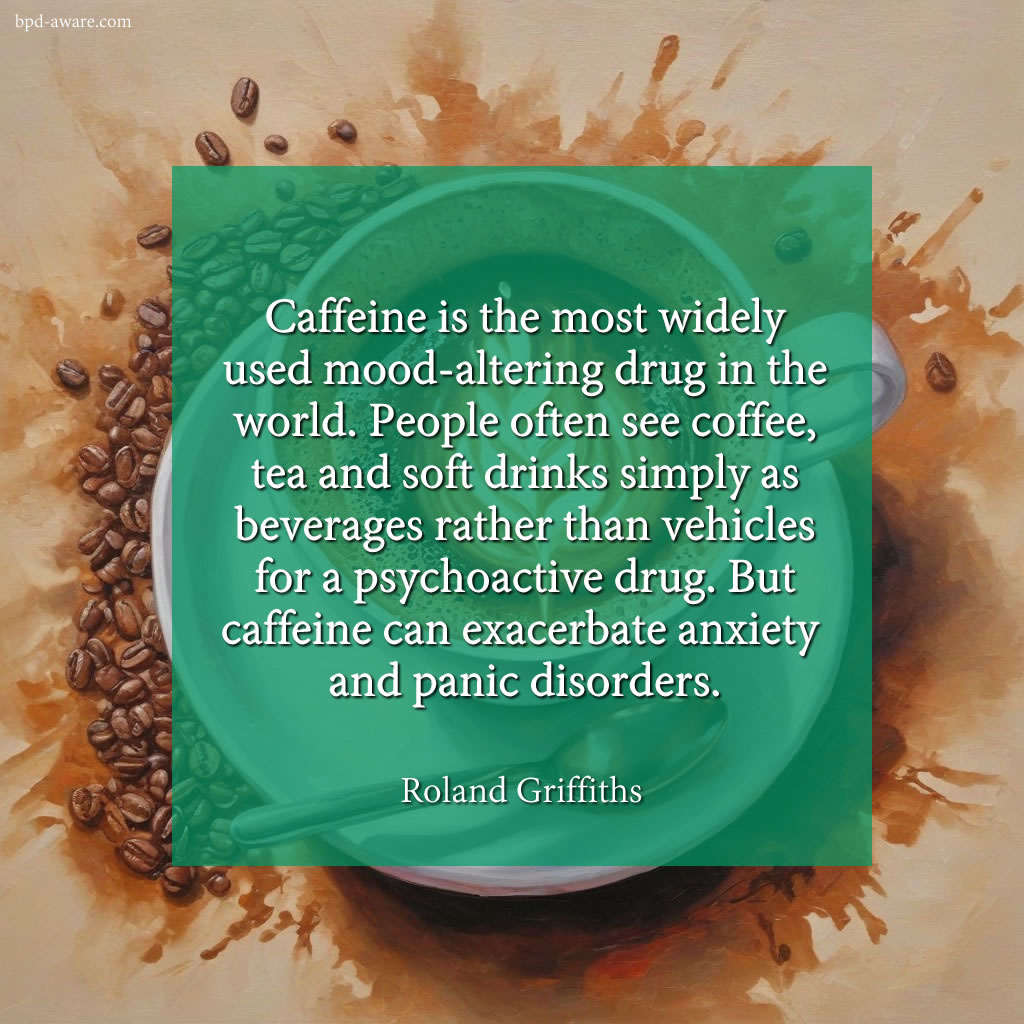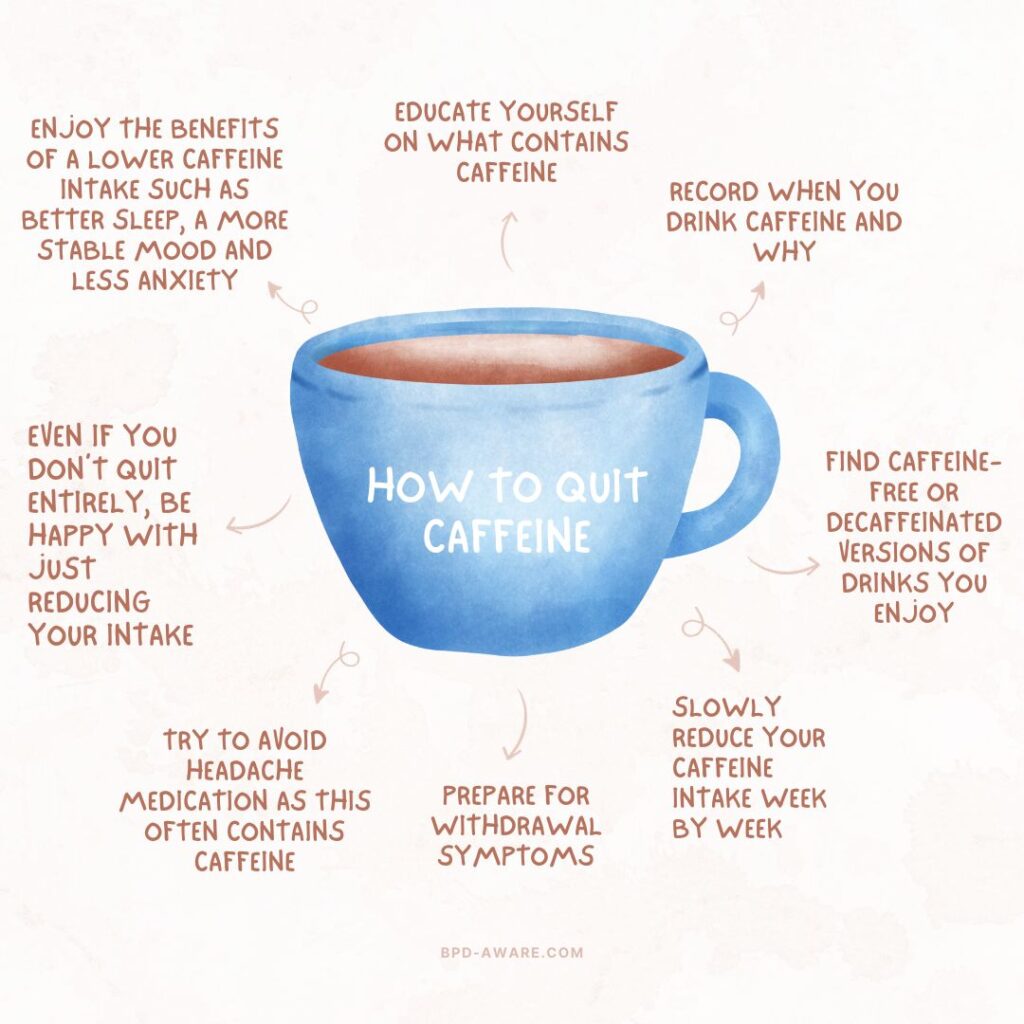Caffeine is the most commonly used drug in the world. Whether it’s the rich aroma of coffee, the delicate taste of tea, or the spark provided by energy drinks – many of us enjoy multiple caffeinated beverages throughout the day. As a Brit, it was common for me to drink several cups of tea a day, until I realized the effect it was having on me.
While most of us know that caffeine can provide a quick pick-me-up during those points of the day when we feel tired, that’s not the only effect caffeine can have. Caffeine has several other effects, some positive and some negative.
When you have Borderline Personality Disorder, you are much more sensitive than the average person – and that includes sensitivity to drugs such as caffeine. In this article, we’ll look at the effects caffeine has on the brain, how this affects someone with BPD in particular, and how to quit caffeine if you decide that’s the right choice for you.
What Contains Caffeine?
First, it’s important to know which foods and beverages contain caffeine. Caffeine is found naturally in certain plants and is commonly added to some foods and beverages. Here’s a list of common sources of caffeine, including a few items that might surprise you:
Beverages:
- Coffee: The most well-known source, including brewed, espresso, and instant varieties.
- Tea: Black, green, white, and oolong teas all contain varying amounts of caffeine.
- Soft Drinks: Many cola and other flavored soft drinks contain caffeine.
- Energy Drinks: Energy drinks typically contain extremely high levels of caffeine, sometimes along with other stimulants.
- Yerba Mate: A South American beverage that’s a significant source of caffeine.
- Guarana Drinks: Beverages made from the guarana berry, commonly found in energy drinks.
Foods:
- Chocolate: All chocolate contains some caffeine, with darker chocolate having more than milk chocolate.
- Coffee-Flavored Products: Ice cream, yogurt, and breakfast cereals with coffee flavors typically contain caffeine.
- Energy Bars: Some bars, especially those marketed for enhanced energy, may include caffeine.
- Supplements and Medications:
- Weight Loss Pills: Some over-the-counter weight loss supplements include caffeine.
- Pre-Workout Supplements: Common in the fitness world, these often contain high amounts of caffeine.
- Pain Relievers and Over-the-Counter Medicines: Certain headache, cold, and allergy medications may have caffeine for its stimulating effects.
Other Sources:
- Decaffeinated Coffee and Tea: Even decaffeinated varieties contain small amounts of caffeine.
- Kombucha: Some varieties of this fermented tea might contain traces of caffeine.
It’s important to read labels and be aware of the potential for caffeine content, especially if you’re sensitive to caffeine or trying to limit your intake. The actual amount of caffeine in these products can vary widely based on brand, preparation method, and serving size.

What Caffeine Does To The Brain
Caffeine acts as a stimulant to the central nervous system. When it reaches the brain, it has a stimulating effect, helping to reduce feelings of tiredness and making you feel more alert. One of the primary mechanisms of caffeine action is blocking adenosine receptors. Adenosine is a neurotransmitter that promotes sleep and relaxation. By blocking these receptors, caffeine prevents the onset of drowsiness induced by adenosine.
Caffeine increases the release of certain neurotransmitters like dopamine and norepinephrine. This can enhance concentration, mood, and alertness. Some studies suggest that caffeine can improve other aspects of brain function too, including memory, alertness, reaction times, energy levels, and cognitive function in general.
Some research suggests that caffeine may offer protection against certain neurological diseases like Parkinson’s and Alzheimer’s, although more research is needed in this area.
The Negative Effects of Caffeine
One of the most common side effects of caffeine is its ability to disrupt sleep. Consuming caffeine in the evening can interfere with healthy sleep patterns, leading to insomnia or reduced sleep quality.
Caffeine can increase alertness, but in higher doses, it might lead to anxiety and nervousness. This is because caffeine stimulates the nervous system, which can exacerbate feelings of anxiety if you’re prone to it. Caffeine can also exacerbate symptoms like panic attacks and depression.
High doses of caffeine may lead to gastrointestinal discomfort in some people. This is because caffeine increases the production of stomach acid, which can cause heartburn or gastroesophageal reflux disease (GERD) in sensitive individuals.
Temporarily, caffeine can cause a spike in blood pressure, which is not a concern for most healthy adults. However, this effect can be more pronounced in people with hypertension or those who are not regular caffeine consumers.
Caffeine stimulates the heart and can cause a temporary increase in heart rate. In some people, especially those sensitive to caffeine or with certain heart conditions, this can be problematic.
High caffeine intake has been linked to a reduction in bone density, especially in individuals who don’t get enough calcium. This is because caffeine can interfere with the body’s ability to absorb calcium.
Regular, prolonged caffeine use can lead to physical dependence. It can be challenging to quit caffeine and may lead to symptoms of withdrawal like headaches, irritability, and tiredness.
How Caffeine Can Affect Someone With Borderline Personality Disorder
Now that we know a little more about caffeine and its effects, both positive and negative, it’s time to talk about how caffeine can affect someone with Borderline Personality Disorder in particular.
Mood Swings: People with BPD often experience intense mood swings, and caffeine can potentially exacerbate these. The stimulant effects of caffeine might enhance feelings of euphoria or irritability, potentially leading to more rapid or intense mood shifts.
Anxiety and Agitation: Caffeine is known to increase alertness and can also heighten anxiety or agitation. For someone with BPD, who may already be prone to anxiety, this could worsen their symptoms.
Sleep Disturbances: Many individuals with BPD struggle with sleep-related issues. Caffeine, especially if consumed later in the day, can disrupt sleep patterns further, leading to insomnia or poor sleep quality. Poor sleep can then exacerbate other symptoms of BPD.
Impulsivity: BPD is often associated with impulsivity. The stimulating effects of caffeine might, in some cases, increase impulsiveness, potentially leading to riskier behaviors or poor decision-making.
Emotional Sensitivity: People with BPD are often highly sensitive to emotional stimuli. Caffeine’s impact on the central nervous system could intensify this sensitivity, making emotional reactions more pronounced.
Stress Response: Caffeine stimulates the adrenal glands, which can increase stress and anxiety levels. For individuals with BPD, this heightened stress response might aggravate symptoms like fear of abandonment, relationship stress, or anger issues.
Medication Interactions: It’s crucial to consider how caffeine might interact with medications commonly prescribed for BPD, such as mood stabilizers, antidepressants, or antipsychotics. Caffeine can have a negative affect on the absorption and effectiveness of some medications.
Given the effects that caffeine can have on people with Borderline Personality Disorder, it’s probably a good idea to reduce caffeine intake to a low level or quit altogether.
How To Quit Caffeine (Or Reduce Intake)
The FDA currently recommends consuming no more than 400mg of caffeine a day. This is around four or five cups of coffee. However, this is a recommendation for the average person rather than someone with BPD.
A safer guide point for someone with Borderline Personality Disorder would be considerably lower. Something more like 120mg per day – which would be a single cup of coffee and one cup of tea – would be much healthier. Zero caffeine would be the ideal but whether you want to go that far will depend on your tolerance to caffeine, how it affects you, and your lifestyle.
The first step to quitting caffeine or reducing your intake is to keep a journal of how much caffeine you drink in a day. Journaling is an important tool in tracking your life and your BPD symptoms, and tracking your caffeine intake is no different. Make a note of how much caffeine you take in each day for about a week to get a good idea of what you need to cut back from. You’ll also want to record the times of the day you typically take caffeine.
While some might consider going cold turkey and quitting caffeine immediately, this is likely not a good option for people with BPD. Harsh withdrawal symptoms can trigger other aspects of BPD and generally make your life miserable. Unless you only use a small amount of caffeine anyway, this is not recommended.
The safer approach would be a gradual reduction of caffeine. Let’s say, for example, you currently drink four cups of coffee a day. For the first week, you might want to switch to three cups of coffee, replacing one with a glass of water or decaf (decaf does contain some caffeine but a significantly lower amount). Preferably you should remove the last cup you have in the day as this will aid sleep. You’ll effectively be reducing your caffeine intake by around 25%. Record how you’ve felt from this reduction. If that’s too much too soon then consider switching one of the cups of coffee to a cup of tea.
If you experience headaches then you may be withdrawing from caffeine too quickly. Many medications used for headaches contain caffeine so relying on those while you cut back on caffeine can defeat the purpose. This is another reason we recommend the slow approach.
Maintain your new caffeine level for around a week before dropping it again. Much like the first time, you can substitute a cup of coffee for tea, decaffeinated coffee, or water and monitor how you feel for a week. You can keep this routine of eliminating and replacing a cup of coffee with water or a less caffeinated substance until you’ve reduced your caffeine intake as much as you want.

Final Thoughts
Choosing to reduce your caffeine content or quit it altogether is a personal journey, one that requires patience and self-awareness. As you step away from your caffeine dependency, you’ll likely discover a more stable and calm energy level, better sleep, and an overall enhanced sense of well-being.
Those benefits are likely to extend to the symptoms you experience with Borderline Personality Disorder. With better sleep and more stable energy levels comes a more stable mood, less anxiety, and fewer feelings of stress.
As someone who used to almost exclusively drink caffeinated beverages, I know cutting down is difficult. It took me several months to cut down from multiple cups of tea and coffee, plus soda, to just one cup of tea and one cup of coffee. But I have felt the benefit. I fall asleep much easier than I used to and feel a lot less anxiety in my life. So, while it can be difficult, I believe it’s worth it.
Sources, Resources, and Further Reading
- How Does Caffeine Affect Borderline Personality Disorder?: https://www.mentalcurve.com/post/how-does-caffeine-affect-borderline-personality-disorder
- Foods to Avoid with Borderline Personality Disorder: https://carespace.health/post/foods-to-avoid-with-borderline-personality-disorder/
- Does anyone else have a problem with caffeine?: https://www.reddit.com/r/BPD/comments/1e2s1ji/does_anyone_else_have_a_problem_with_caffeine/
- Removing caffeine has greatly improved my BPD: https://www.reddit.com/r/BPD/comments/psgdwt/removing_caffeine_has_greatly_improved_my_bpd/
















